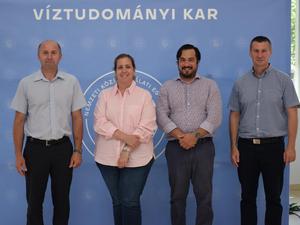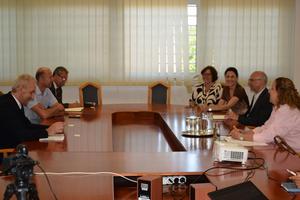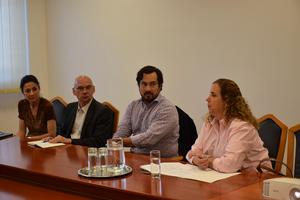Her Excellency Cynthia Marie Mayer Zavala, the Ambassador Extraordinary and Plenipotentiary of Ecuador, visited the Faculty to personally familiarize herself with the institution’s educational and research profile and to explore opportunities for professional cooperation between the two countries. The visit was organized by Dr Pier Paolo Pigozzi Sandoval, Vice-Rector for International Affairs at the Ludovika University of Public Service, who also conveyed the Faculty leadership’s commitment to international partnerships.
The visit focused on shared challenges and opportunities in the field of water management. While Ecuador and Hungary differ in geographical and climatic conditions, both countries face similar water management issues: the effects of climate change are becoming increasingly pronounced, with more frequent and intense droughts, and the redistribution of water resources requiring urgent adaptation in policy and water management practices.
In Ecuador, prolonged droughts in recent years have also threatened energy security, as a significant portion of the country's energy production relies on hydropower. In Hungary, meanwhile, agriculture and natural water bodies are suffering from changes in precipitation patterns, with alternating floods and droughts posing serious challenges for water management, infrastructure, and adaptation strategies.
Ambassador Zavala expressed her appreciation for the Faculty’s educational and research efforts, particularly its commitment and expertise in addressing water-related issues linked to climate change. The meeting included discussions on future opportunities for cooperation in the form of joint education, research, or international development projects. Special attention was given to encouraging student and faculty mobility and enabling young water professionals to gain experience and transformative knowledge in an international environment.
The Faculty leadership presented its international activities, partnerships, and the educational strategy built on principles of sustainable water management. Through project-based learning, students tackle real-world challenges, preparing them to manage future water-related issues. This approach could also be highly relevant for Ecuador, especially in areas like improving access to water in local communities, developing irrigation systems, and maintaining natural water sources.
Both parties reaffirmed their intention to establish long-term professional cooperation. They agreed that equitable access to water, water quality preservation, the provision of safe drinking water, wastewater treatment, water-based energy management, and mitigating the impacts of climate change are universal concerns that require international collaboration—especially between countries whose experiences can complement one another.
Ambassador Cynthia Marie Mayer Zavala’s visit marked an important step toward strengthening bilateral relations and stands as an excellent example of how the Faculty of Water Sciences— as a key institution in Hungarian water education—actively contributes to global professional dialogue and the building of a sustainable future.
Text and Photo: Faculty of Water Science


